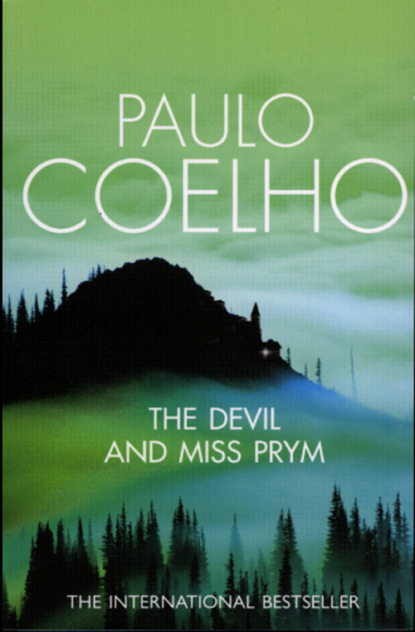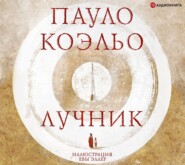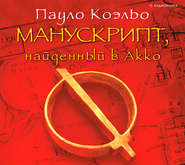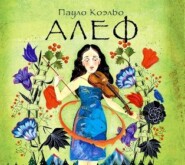По всем вопросам обращайтесь на: info@litportal.ru
(©) 2003-2024.
✖
The Devil and Miss Prym
Автор
Год написания книги
2019
Настройки чтения
Размер шрифта
Высота строк
Поля
The hands that had touched the gold should now be washing the dirty dishes, wielding the sponge and the dishcloth. Chantal turned her back on the treasure and returned to the village, where the hotel landlady was waiting for her, looking vaguely irritated, since Chantal had promised to clean the bar before the one hotel guest was up.
Chantal’s fears proved unfounded: the stranger did not leave. She saw him in the bar that night, more seductive than ever, telling tales that might not have been entirely true, but which, at least in his imagination, he had lived intensely. Once again their eyes only met impersonally, when he offered to pay for the regulars’ drinks.
Chantal was exhausted. She was praying that they would all leave early, but the stranger seemed particularly inspired, recounting story after story, which his listeners lapped up, with the interest and the hateful respect – or, rather, craven submissiveness – that country people show in the presence of those who come from the big cities, judging them to be more cultivated, educated, intelligent and modern.
‘Fools,’ she said to herself. ‘They don’t understand how important they are. They don’t understand that whenever someone lifts a forkful of food to their mouth, anywhere in the world, it’s thanks to people like the inhabitants of Viscos, who toil from dawn to dusk, working the land with the sweat of their weary bodies, and caring for their livestock with indescribable patience. They are far more necessary to the world than all those city people, yet they behave as if they were inferior beings, uptight and talentless – and they believe it too.’
The stranger, however, seemed determined to show that his culture was worth more than all the labours of the men and women in the bar. He pointed to a print hanging on the wall:
‘Do you know what that is? It’s one of the most famous paintings in the world: The Last Supper, painted by Leonardo da Vinci.’
‘It can’t be as famous as all that,’ said the hotel landlady. ‘It was very cheap.’
‘That’s only a reproduction: the original is in a church a long, long way from here. But there’s a story about this picture you might like to hear.’
Everyone nodded, though once again Chantal felt ashamed to be there, listening to a man showing off his pointless knowledge, just to prove that he knew more than anyone else.
‘When he was creating this picture, Leonardo da Vinci encountered a serious problem: he had to depict Good – in the person of Jesus – and Evil – in the figure of Judas, the friend who resolves to betray him during the meal. He stopped work on the painting until he could find his ideal models.
‘One day, when he was listening to a choir, he saw in one of the boys the perfect image of Christ. He invited him to his studio and made sketches and studies of his face.
‘Three years went by. The Last Supper was almost complete, but Leonardo had still not found the perfect model for Judas. The cardinal responsible for the church started to put pressure on him to finish the mural.
‘After many days spent vainly searching, the artist came across a prematurely aged youth, in rags and lying drunk in the gutter. With some difficulty, he persuaded his assistants to bring the fellow directly to the church, since there was no time left to make preliminary sketches.
‘The beggar was taken there, not quite understanding what was going on. He was propped up by Leonardo’s assistants, while Leonardo copied the lines of impiety, sin and egotism so clearly etched on his features.
‘When he had finished, the beggar, who had sobered up slightly, opened his eyes and saw the picture before him. With a mixture of horror and sadness he said:
‘“I’ve seen that picture before!”
‘“When?” asked an astonished Leonardo.
‘“Three years ago, before I lost everything I had, at a time when I used to sing in a choir and my life was full of dreams. The artist asked me to pose as the model for the face of Jesus.”’
There was a long pause. The stranger was looking at the priest, who was drinking his beer, but Chantal knew his words were directed at her.
‘So you see, Good and Evil have the same face; it all depends on when they cross the path of each individual human being.’
He got up, made his excuses, saying he was tired, and went up to his room. Everyone paid what they owed and slowly left the bar, casting a last look at the cheap reproduction of the famous painting, asking themselves at what point in their lives they had been touched by an angel or a devil. Without anyone saying a word to anyone else, each came to the conclusion that this had only happened in Viscos before Ahab brought peace to the region; now, every day was like every other day, each the same as the last.
Exhausted, functioning almost like (#ulink_8e6d0d85-0406-5d2c-8a30-79b249d63fbf)an automaton, Chantal knew she was the only person to think differently, for she alone had felt the heavy, seductive hand of Evil caressing her cheek. ‘Good and Evil have the same face, it all depends on when they cross the path of each individual human being.’ Beautiful, possibly true words, but all she really needed now was to sleep, nothing more.
She ended up giving the wrong change to one of the customers, something which almost never happened; she apologised, but did not feel overly guilty. She carried on, inscrutable and dignified, until the priest and the local mayor – generally the last to leave – had departed. Then she shut up the till, gathered her things together, put on her cheap, heavy jacket and went home, just as she had done for years.
On the third night, then, she found herself in the presence of Evil. And Evil came to her in the form of extreme tiredness and a soaring fever, leaving her in a half-conscious state, but incapable of sleep – while outside in the darkness, a wolf kept howling. Sometimes she thought she must be delirious, for it seemed the wolf had come into her room and was talking to her in a language she couldn’t understand. In a brief moment of lucidity, she attempted to get up and go to the church, to ask the priest to call a doctor because she was ill, very ill; but when she tried to convert her intentions into actions, her legs gave way beneath her, and she was convinced she would be unable to walk.
Or, if she did manage to walk, she would be unable to reach the church.
Or, if she did reach the church, she would have to wait for the priest to wake up, get dressed and open the door, and meanwhile the cold would cause her fever to rise so rapidly that she would drop dead on the spot, right there outside the house that some considered to be sacred.
‘At least they wouldn’t have far to take me to the cemetery: I’d be virtually inside it already,’ she thought.
Chantal’s delirium lasted all night, but she noticed that her fever began to diminish as the morning light came filtering into her room. As her strength returned and she was trying to get to sleep, she heard the familiar sound of a car horn and realised that the baker’s van had arrived in Viscos and that it must be time for breakfast.
There was no one there to make her go downstairs to buy bread; she was independent, she could stay in bed for as long as she wanted, since she only began work in the evening. But something had changed in her; she needed contact with the world, before she went completely mad. She wanted to be with the people she knew would now be gathering around the little green van, exchanging their coins for bread, happy because a new day was beginning and they had work to do and food to eat.
She went across to the van, greeting them all, and heard one or two remarks like: ‘You look tired’ or ‘Is anything wrong?’. They were kind and supportive, always ready to help, simple and innocent in their generosity, while her soul was engaged in a bitter struggle for dreams and adventures, fear and power. Much as she would have liked to share her secret, she knew that if she revealed it to a single one of them, the rest of the village would be sure to know it before the morning was over. It was better to thank them for their concern and to carry on alone until her ideas had become a little clearer.
‘No, it’s nothing. There was a wolf howling all night and I couldn’t get to sleep.’
‘I didn’t hear any wolf,’ said the hotel landlady, who was also there buying bread.
‘It’s been months since any wolves were heard in the area,’ confirmed another woman who made conserves to be sold in the hotel shop. ‘The hunters must have killed them all, which is bad news for us because the wolves are the main reason the hunters come up here at all, to see who can kill the most elusive animal in the pack. It’s a pretty pointless exercise, but they love it.’
‘Don’t say anything in front of the baker about there being no more wolves in the region,’ muttered Chantal’s boss. ‘If word gets out, no one will come to Viscos at all.’
‘But I heard a wolf.’
‘Then it must have been the rogue wolf,’ said the mayor’s wife, who didn’t much like Chantal, but who was sufficiently well-bred to hide her feelings.
The hotel landlady got annoyed. There was no rogue wolf. It was just an ordinary wolf, and it was probably dead by now anyway.
The mayor’s wife, however, would not give up so easily.
‘Regardless of whether or not it exists, we all know that there were no wolves howling last night. You work the poor girl too hard, up until all hours; she’s so exhausted she’s starting to get hallucinations.’
Chantal left the pair of them to their argument, picked up her bread and went on her way.
‘A pointless exercise,’ she repeated to herself, recalling the comment made by the woman who made the conserves. That was how they viewed life, as a pointless exercise. She nearly told them about the stranger’s proposal there and then, just to see if those smug, narrow-minded people would be willing to take part in a genuinely purposeful exercise: ten gold bars in exchange for a simple murder, one that would guarantee the futures of their children and their grandchildren and return Viscos to its former glory, with or without wolves.
But she held back. She decided instead to tell the story that very night, in front of everyone, in the bar, so that no one could claim not to have heard or understood. Perhaps they would fall on the stranger and march him straight to the police, leaving her free to take her gold bar as a reward for services rendered to the community. Perhaps they simply wouldn’t believe her, and the stranger would depart believing that they were all good, which wasn’t the case at all.
They were so ignorant, so naïve, so resigned to their lot. They refused to believe anything that didn’t fit in with what they were used to believing. They all lived in fear of God. They were all – herself included – cowards when the moment comes to change their fate. But as far as true goodness was concerned, that didn’t exist – not in the land of cowardly men, nor in the heaven of Almighty God who sows suffering everywhere, just so that we can spend our whole lives begging him to deliver us from Evil.
The temperature had dropped. Chantal hadn’t slept for three nights, but once she was preparing her breakfast, she felt much better. She wasn’t the only coward, though she was possibly the only one aware of her own cowardice, because the rest of them thought of life as a ‘pointless exercise’ and confused fear with generosity.
She remembered a man who used to work in a chemist’s in a nearby village and who had been dismissed after twenty years’ service. He hadn’t asked for his redundancy money because – so he said – he considered his employers to be his friends and didn’t want to hurt them, because he knew they had had to dismiss him because of financial difficulties. It was all a lie: the reason the man did not go to court was because he was a coward; he wanted at all costs to be liked; he thought his employers would then always think of him as a generous, friendly sort. Some time later, when he went back to them to ask for a loan, they slammed the door in his face, but by then it was too late, for he had signed a letter of resignation and could make no further demands of them.
Вы ознакомились с фрагментом книги.
Приобретайте полный текст книги у нашего партнера:
Приобретайте полный текст книги у нашего партнера:

















